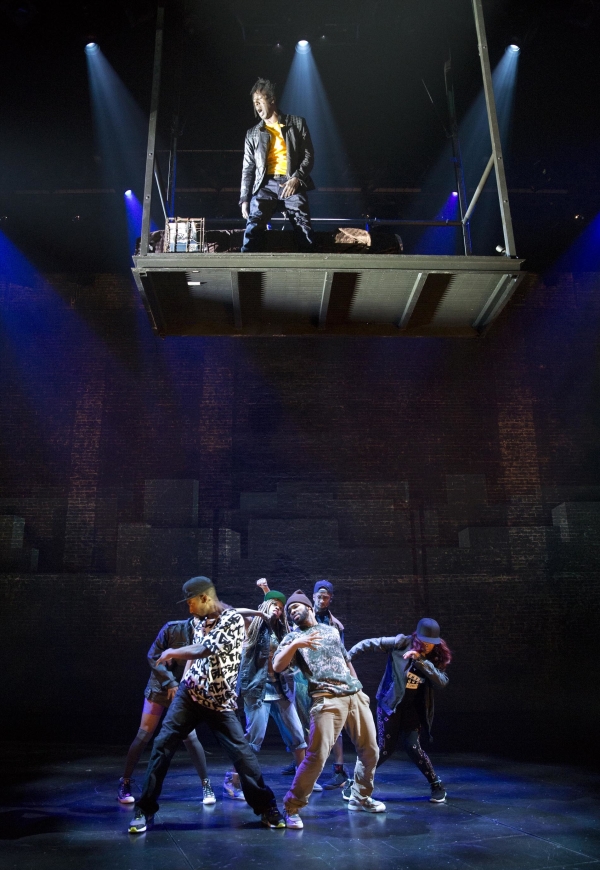Holler If Ya Hear Me

(© Joan Marcus)
Out-of-town tryouts, a once-popular way of finessing a new show's kinks in front of a non-New York audience, are rapidly approaching extinction. More and more, productions arrive in New York relatively untested, determined to fix as many bugs as they can in front of some of the most discerning audiences anywhere. But opening cold on Broadway is a dicey prospect. And in the case of Holler If Ya Hear Me, a new musical that utilizes the songs of legendary rap artist Tupac Shakur to explore gun and gang violence in 2014, a cold opening wasn't to its benefit.
That's not to say Holler If Ya Hear Me, which plays the Palace Theatre under the direction of recent Raisin in the Sun Tony winner Kenny Leon, is a total loss. It is extremely well-performed, with a cast led by the dynamic poet-performer Saul Williams in a roof-raising Broadway debut. It features an ensemble of energetic dancers and singers who bring Shakur's profound, scarily prescient lyrics to thrilling life. The show's problems lie in the book — penned by musical-theater newbie Todd Kreidler — which almost singlehandedly brings the experience down.
Williams plays John, an African-American man newly released from prison after serving half of a 12-year sentence. John returns to his anonymous Midwestern industrial-city hometown to restart his life in as unassuming a manner as possible. On his first day of work at the local autoshop, his close-knit community is rocked by the shooting death of Benny (Donald Webber Jr.), the little brother of John's childhood pal Vertus (Christopher Jackson). Benny's murder, we learn, was at the hands of the 4-5s, a local gang aiming to blackmail Vertus, who is involved with a scheme involving fraudulent gift cards. John uses his growing frustrations at society as the impetus to initiate a gang war.
In an era where shootings and other seemingly unprovoked attacks make daily headlines, the desire to craft a musical about the perils of gun and gang violence is important. Holler If Ya Hear Me aims high and at the heart in its efforts to introduce audiences to a community woefully underrepresented on the Broadway stage. But Kreidler, a dramaturg who first cut his teeth working with the late August Wilson on his plays Radio Golf and Gem of the Ocean, probably wasn't the best choice to take on this job; his inexperience in musical-theater writing is on blatant display in the script's vague storytelling and extreme lack of dramatic tension.
Some of this stems from the fact that Kreidler never introduces us to the 4-5s; we only hear about their misdeeds. They're like Samuel Beckett's Godot — always looming over the action but never seen. This turns Holler If Ya Hear Me itself into a version of West Side Story where you only see the perspective of the good-guy Tony and the Jets, but nothing of Maria and the Sharks. Various other plot points come and go, mentioned once and never heard from again; the whole thing often feels like the show was once a lot longer and all of the connective tissue was cut for timing.
Leon's smooth-moving production, which features a looming physical set by Edward Pierce augmented with projections by Zachary Borovay, tries to compensate for the script's flaws and does so admirably. Wayne Cilento provides eye-popping hip-hop-music-video choreography, flashily lit by Mike Baldassarri and danced with jaw-dropping skill by an ensemble numbering 30. In the central roles, Williams and Jackson have extraordinary presence, and when they start rapping, it's with a crystal clarity that would make the late Shakur proud (as would John Shivers and David Patridge's exemplary sound design offered to his sung words). The other principal cast members, namely Ben Thompson as the proprietor of the auto shop, and Saycon Sengbloh as the former girlfriend of both John and Vertus, do their best with minimal material. Great theater actors Tonya Pinkins and John Earl Jelks are shamefully wasted in glorified cameos.
What comes off the best, though, are Shakur's songs, orchestrated for a band of 10 by Daryl Waters. More intelligent, passionate, and evocative lyrics have not been seen on Broadway in recent memory. They deserve a better foundation on which to stand.










